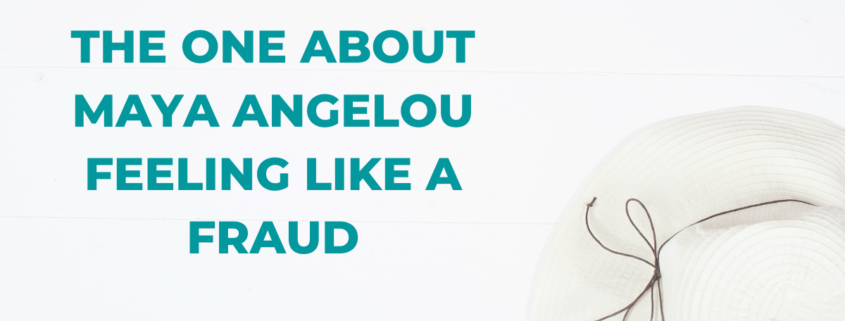The one about Maya Angelou feeling like a fraud
I’m worried I don’t have the credibility or credentials to help people the way I want to.
What if I do more harm than good?
I’m afraid I’ll be criticized.
I hear statements like this regularly from clients, even ones who have experience and credentials coming out of their ears (not too mention hearing these things at times in my own head).
At the root of this concern is a mix of thoughtfulness and humility (healthy and helpful) and Impostor Syndrome (not so helpful).
It’s good to be humble and teachable. As I wrote in a Facebook Group this past week: “A coach that is not teachable is dangerous.” (This was in response to a number of popular, influential leaders who have done a good deal of harm lately by not knowing when and how to listen and learn.)
On the other hand, Impostor Syndrome hinders us because it is a pattern of doubting our experience, accomplishments, and abilities that leads to a persistent fear of being exposed as a “fraud,” all of this despite evidence to the contrary.
Nobel Laureate Maya Angelou, a beloved author, activist and poet once said,
I have written 11 books, but each time I think, ‘uh oh, they’re going to find out now. I’ve run a game on everybody, and they’re going to find me out.’
Can you imagine if Maya Angelou had given in to that voice and kept silent? How many people would have never been inspired by her words and actions?
Too often, we let this feeling of being an impostor keep us silent.
Your silence has a cost. It costs you the confidence, fulfillment, opportunity, self-actualization that comes from being heard (and seen) by others, and having that truth leave a lasting impact on their lives.
It costs those who need to hear your story, ideas, message, perspective, and expertise…all of which you have lived through and earned.
And yet, we so easily discount our own experience.
I don’t need to be a social worker or psychologist to talk about my experience with mental health challenges. I can be honest about what I don’t know, what I am still learning, and when it’s appropriate to go to someone else for help I can’t provide.
Personally, I’m grateful for the myriad of podcast interviews I’ve listened to where people shared their experience living with anxiety, depression, and ADHD. It’s been one of the most healing and insightful tools in my journey, just as vital as any doctor’s prescription or therapist’s guidance.
There are those who will resonate with your voice more in a given moment than they resonate with the PhD, MBA, Dr. after someone’s name. Both types of experience have their place. Don’t discount the fact that sometimes yours is the ONE that catalyzes them, or makes them feel seen.
To be clear, this isn’t about pretending to have the expertise you don’t have. It’s about recognizing the value of the experience and expertise that you do have. Most of us have been raised to count academics, economics, and fame as arbiters of success. It takes unlearning to remember the extraordinary value of intuition, empathy, and lived experience.
It’s freeing to know you don’t need to know it all. You don’t need to be the smartest or most knowledgeable one in your field. What your readers, clients, and audience need is YOU, as long as you bring the complete, vulnerable, authentic you to the table.
No matter what market you are in, what message you offer, or what audience you serve, your voice is important. Share it.



